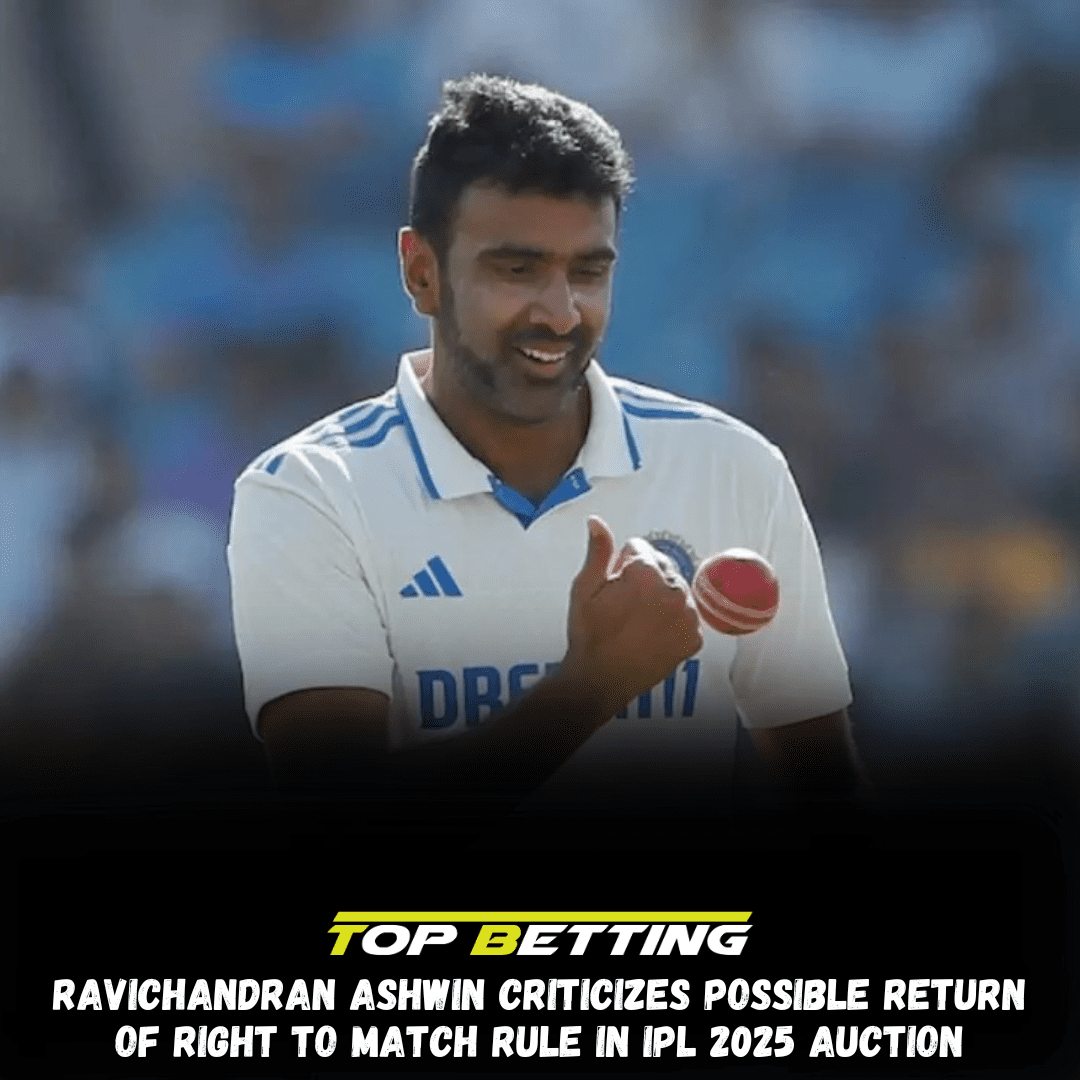
Ravichandran Ashwin Criticizes Possible Return of Right to Match Rule in IPL 2025 Auction
As the anticipation builds for the Indian Premier League (IPL) 2025 auction set to take place at the end of this year, the Board of Control for Cricket in India (BCCI) is leaving no stone unturned in its preparations. Earlier in August, the BCCI held a pivotal meeting with the owners of the ten league franchises to discuss key issues and potential changes to the IPL player regulations. This “constructive dialogue” aimed to shape the future of the league, with several significant topics on the table, including the possible reinstatement of the Right to Match (RTM) rule, the frequency of mega auctions, the availability of overseas players, and the limits on player retentions.
The RTM rule, which could make its return during this year’s auction, has sparked considerable debate among players, franchises, and cricket enthusiasts alike. Indian off-spinner Ravichandran Ashwin, never one to shy away from voicing his opinion, has come forward with a sharp critique of the RTM rule, arguing that it is inherently unfair to the players.
The RTM rule allows a franchise to retain a player who represented them in the previous season by matching the highest bid made by another franchise during the auction. This mechanism was last used in the 2018 auction but was subsequently dropped for the 2021 mega auction to ensure that the new franchises, Gujarat Titans and Lucknow Super Giants, had a broader pool of players to choose from. With discussions of its potential return, Ashwin has raised concerns about its implications for player value and fairness.
Speaking candidly on his YouTube channel, Ashwin dissected the RTM rule, explaining why he believes it is detrimental to players. “There is no rule more unfair for a player than RTM,” Ashwin declared, setting the tone for his detailed critique.
Ashwin illustrated his point with a hypothetical scenario involving a player, referred to as “Player X,” and his former franchise, Sunrisers Hyderabad (SRH). Suppose Player X, with a current market value of around ₹5-6 crores, enters the auction with a base price of ₹2 crores. The bidding begins, and teams like Kolkata Knight Riders (KKR) and Mumbai Indians (MI) engage in a fierce bidding war, driving the price up to ₹6 crores. Just when it seems that one of these teams will secure Player X, SRH exercises their RTM option, matching the final bid and retaining the player for ₹6 crores.
“Now, Sunrisers are happy because they got the player back,” Ashwin explained. “But KKR and MI are unhappy because they put in the effort to bid for the player, only to lose out at the last moment. The only party truly satisfied is Sunrisers. They essentially gave a token bid at the base price and then swooped in to reclaim the player after other franchises drove up the price.”
Ashwin argued that this process is inherently unfair because it does not reflect the true value of the player. In his view, the RTM rule distorts the auction dynamics by allowing a franchise to capitalize on the efforts of other bidders without fully committing to the process. “The problem with RTM is that it is not fair value for the player,” Ashwin asserted. “If you give three RTMs to each team, the players will only go virtually empty-handed. Already, they do not get fair value in the auction.”
The core of Ashwin’s criticism lies in the perceived inequity of the RTM rule. He believes that the rule undermines the auction process, where a player’s value should be determined by open and competitive bidding. Instead, the RTM rule allows franchises to benefit from the bidding wars initiated by other teams, ultimately depriving players of their true market worth.
Ashwin’s concerns resonate with the broader discussion surrounding the IPL auction and its impact on players. The auction is a high-stakes event where players’ careers and financial futures are often on the line. The reintroduction of the RTM rule could potentially limit the earning potential of certain players, particularly those who are highly sought after by multiple franchises.
Furthermore, the debate over RTM touches on the balance of power within the league. Franchises with deep pockets and a strong core of retained players could use the RTM rule to their advantage, further consolidating their dominance. This could make it more challenging for other teams to build competitive squads, potentially skewing the balance of the league.
As the BCCI continues its discussions with the franchise owners, the fate of the RTM rule remains uncertain. However, Ashwin’s critique adds a significant voice to the conversation, highlighting the need for a fair and transparent auction process that benefits both players and teams.
The IPL auction has always been a subject of intense scrutiny and debate, with each edition bringing its own set of challenges and controversies. Whether or not the RTM rule makes a comeback in 2025, it is clear that the discussions surrounding it will play a crucial role in shaping the future of the league.
As fans and stakeholders await the final decisions, the spotlight remains on the BCCI and the franchise owners to strike a balance that preserves the competitive spirit of the IPL while ensuring that players are fairly compensated for their contributions to the game.












